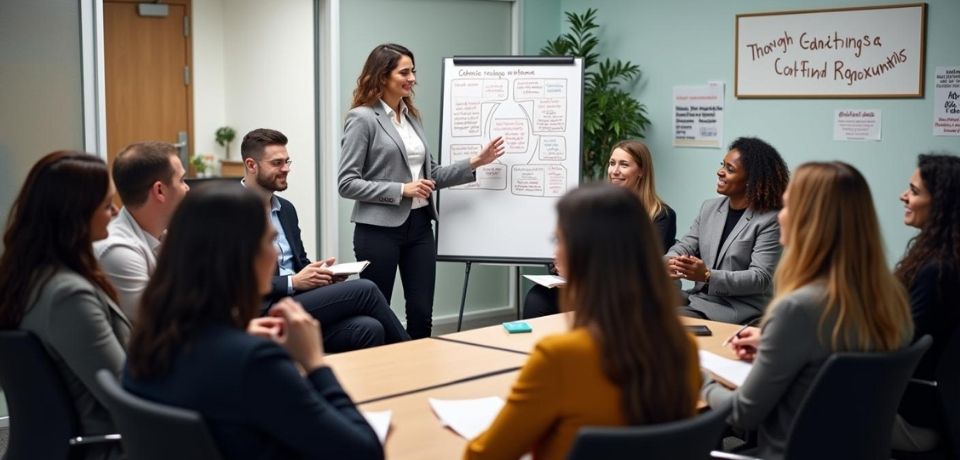The training in conflict resolution empowers individuals with the skills they need to resolve disagreements and encourage cooperation within the workplace. Whether you’re a professional seeking to improve workplace harmony or an individual looking for better relationships, this training can make a real difference. But how long is conflict resolution training, and what options are available to suit different needs?
The duration of conflict resolution training programs varies, from short online courses lasting a few hours to in-depth certificate programs lasting weeks or months. However, workshops typically last 1-2 days, while corporate training can range from a day to several weeks.
To explore which option is right for you and your schedule, we will discuss the details as we explore the options.
How Long is Conflict Resolution Training?
Conflict resolution training can vary from a few hours to over a year, depending on the format and purpose. Short courses and online programs often take hours to days, while workshops last 1-2 days. Certificate programs extend to weeks or months, with advanced diplomas requiring up to a year. The timeline depends on the depth of content, delivery method, and intended audience.

Purpose of the Training
The purpose of training plays a vital role in determining its length. Programs specifically designed for basic communication skills are often brief. In contrast, advanced courses addressing complex conflict scenarios need extended periods to cover in-depth concepts effectively.
Professional roles also impact the required duration of training, depending on the specific needs of each participant. For instance, employees may require a one-day conflict resolution training program compared to a manager addressing team conflicts who may require a longer training program. These programs are organized to provide role-specific tools, ensuring participants gain the necessary skills within an appropriate timeframe.
Level of Expertise
The required expertise significantly influences how long training sessions last. Beginners usually engage in shorter programs to grasp essential techniques. More experienced participants take advanced sessions, diving deeper into nuanced conflict resolution frameworks.
Specialized courses cater to those pursuing professional credentials or industry roles. These courses last longer as they integrate real-world applications. The curriculum ensures participants master their craft and apply concepts confidently.
Delivery Format
The format of training contributes to how long it takes to complete. Online courses and e-learning modules are often concise. They provide flexible timelines, allowing learners to progress at their preferred pace.
In-person workshops require set schedules, making them more time-structured. Participants benefit from hands-on activities, typically lasting 1–2 days. Blended formats combine online and in-person elements, balancing flexibility and experiential learning.
Target Audience
Training designed for specific audiences impacts the overall duration. Corporate programs for employees or leaders usually align with organizational goals. These are often shorter and customized to fit workplace schedules.
Conversely, programs aimed at mediators or conflict coaches require more time. They focus on in-depth techniques, certifications, and experiential scenarios. Knowing the target audience helps in structuring the duration effectively.
Certification Requirements
Earning a recognized certificate can lengthen training times. Certificate programs often require participants to meet specific benchmarks. These include theory, practical application, and testing to ensure competency.
Graduate diplomas or advanced credentials typically take longer. They cover complete modules, case studies, and capstone projects. Certification timelines vary depending on the program’s rigor and industry standards.
Organizational Needs
Custom corporate training programs adapt to an organization’s particular requirements. A single-day session might suffice for introducing conflict basics. Longer training becomes essential for aligning with strategic goals and leadership development.
Organizations with diverse needs may invest in multi-week programs. These are designed to address specific challenges and improve workplace harmony. Flexible durations help maximize impact within the company context.
Program Complexity
The complexity of a program’s content affects its length. Simple training focuses on foundational conflict resolution skills and techniques. These programs are shorter but provide immediate practical tools for everyday scenarios.
Advanced programs emphasize analytical frameworks and negotiation strategies. They involve case studies and interactive sessions, extending the timeline. Comprehensive training equips participants to handle multifaceted disputes confidently.
The Average Cost of Conflict Resolution Training
- Online/Virtual Training: $50-$200 per person
- In-Person Workshops: $1,000-$3000 per person
- Customized Corporate Training: $1,000-$5,000 or more per day
Conflict resolution training costs vary depending on the delivery method, audience, and program specifics. Online or virtual training is affordable, costing $50 to $200 per person for quick sessions. In-person workshops are pricier, ranging from $1,000 to $3,000 for more interactive, hands-on learning experiences. Customized corporate training demands a higher budget, typically costing $1,000 to $5,000 or more per day.
The program’s scope and organization size influence the overall investment required for training. Smaller groups might spend less, while large-scale corporate training costs more due to personalization. Online options are budget-friendly but lack direct interaction, which in-person workshops provide. Companies should evaluate their needs and goals before choosing the right type of conflict resolution program.
Common Formats of Conflict Resolution Training
Conflict resolution training comes in various formats, designed for diverse learning preferences and professional needs. Whether you prefer online courses, interactive workshops, or customized corporate sessions, there’s a style for everyone. You can choose the format that best fits your schedule and goals by knowing these types of formats.

Online Self-Paced Courses
Online self-paced courses are perfect for individuals with flexible schedules seeking convenient learning options. These courses are affordable, accessible, and provide structured modules for foundational skills. Participants can complete lessons at their own pace, making them ideal for busy professionals. Although interaction is minimal, the content often includes videos, quizzes, and downloadable resources.
In-Person Workshops
In-person workshops provide profound learning experiences with hands-on activities, role-playing, and group discussions. These sessions are led by expert trainers and encourage real-time engagement. Workshops typically last 1-2 days and focus on practical conflict resolution techniques. They are suitable for teams or individuals seeking face-to-face interaction and immediate feedback.
Customized Corporate Training
Customized corporate training is designed to address specific organizational needs, goals, and challenges. Companies can request specially designed programs that align with their industry requirements. These sessions often include interactive activities and role-specific scenarios to improve workplace conflict management skills. Training durations vary, from single-day sessions to multi-week programs.
Certificate Programs
Certificate programs are extensive, offering an in-depth exploration of conflict resolution theories and practices. These programs cater to professionals seeking formal recognition of their skills. Typically, lasting weeks to months, they include assignments, case studies, and practical applications. Participants gain advanced techniques that are valuable in specialized roles, such as mediators.
Graduate Diplomas and Advanced Training
Graduate diplomas offer the most extensive conflict resolution education, covering advanced methodologies and complex dispute resolution scenarios. These programs take up to a year and are highly rigorous. They are ideal for professionals pursuing careers in mediation, law, or leadership roles. Participants develop expertise through research, internships, and real-world projects.
Choosing the right training format depends on your goals, budget, and preferred learning style. Whether you choose online courses, in-person workshops, or advanced programs, there’s an option suited for every need. In that case, knowing conflict resolution skills classification helps you identify the best program to enhance your abilities and handle disputes confidently in any situation.
Short-Term vs. Long-Term Training Programs: Which One is Right for You?
When choosing conflict resolution training, deciding between short-term and long-term programs is crucial. Your individual needs and goals determine whether you should opt for a short-term or long-term training program. Here’s a breakdown to help you decide:
Short-Term Training Programs
- Duration: Typically lasts a few days to a few weeks.
- Focus: Specific skills or knowledge.
- Benefits:
- Quick and efficient way to learn new skills.
- Cost-effective.
- Flexible scheduling options.
- Ideal for busy professionals.
- Drawbacks:
- Limited depth of knowledge.
- May not provide comprehensive learning.
- Less likely to lead to formal qualifications.
Long-Term Training Programs
- Duration: Typically last several months or years.
- Focus: In-depth knowledge and comprehensive understanding.
- Benefits:
- Provide a thorough foundation in a particular field.
- Lead to formal qualifications (degrees, diplomas, certificates).
- Offer opportunities for networking and career development.
- Drawbacks:
- Time-consuming and expensive.
- May require a significant time commitment.
- Less flexible scheduling options.
Here’s a quick guide to help you choose:
- Choose a short-term program if:
- You need to learn a specific skill quickly.
- You have limited time and budget.
- You prefer a flexible learning experience.
- Choose a long-term program if:
- You want to gain in-depth knowledge and expertise.
- You are seeking formal qualifications.
- You have the time and resources to invest in your education.
So, the best choice for you will depend on your individual circumstances, career goals, and learning style. Consider your priorities, time constraints, and budget before making a decision.
What Can You Expect to Learn in Conflict Resolution Training?
Conflict resolution training equips you with essential tools to effectively handle disputes and encourage learning in various settings. It builds your ability to identify conflicts early, manage emotions, and communicate effectively. By participating, you’ll develop the confidence to address challenging situations professionally and personally. Here’s what you can expect to explore during these programs:
Learning Conflict Dynamics
Learn how conflicts arise and why they escalate in different environments. Training helps you identify root causes and potential triggers, while also allowing you to learn conflict resolution skills. You’ll explore the psychological and behavioral aspects that drive disagreements, providing a foundation for effectively managing disputes.
Effective Communication Techniques
Discover communication methods that promote learning and reduce tension during conflicts. Active listening is emphasized to encourage productive dialogues. Training also focuses on non-verbal cues and their importance in interactions. You’ll practice framing responses that de-escalate conflicts and build mutual trust.
Emotional Intelligence in Conflict
Developing emotional intelligence is a cornerstone of conflict resolution training. You’ll learn to recognize and regulate your emotions effectively. Training emphasizes empathy to understand others’ perspectives during disputes. This approach promotes positive relationships and helps maintain a calm demeanor under pressure.
Problem-Solving and Negotiation Skills
You’ll learn structured approaches to finding solutions that benefit all parties involved. Techniques like brainstorming and compromise are taught. Negotiation strategies are explored to achieve agreements while preserving relationships. These skills are vital for managing both personal and professional disputes.
Cultural Sensitivity in Conflict Resolution
Conflicts often involve individuals with diverse cultural backgrounds and beliefs. Training addresses the importance of understanding cultural differences in resolving disputes. You’ll explore strategies for implementing respect and inclusivity in sensitive situations. This awareness ensures fair and equitable resolutions in multicultural settings.
Mediation and Facilitation Techniques
Gain insights into facilitating discussions and mediating disputes between groups or individuals. Training introduces frameworks for guiding conversations constructively. You’ll learn how to maintain neutrality while steering toward resolutions. These techniques are invaluable for leaders and aspiring mediators alike.
How to Maximize the Benefits of Conflict Resolution Training?
The right mindset and strategies can make conflict resolution training transformative. Whether it’s a short session or an in-depth program, applying practical tips ensures you get the most value. Here are some actionable ways to make the experience impactful and effective:

- Set Clear Goals Before Starting: Identify what you hope to gain from the training experience and focus on those outcomes. Clear objectives keep you motivated and aligned throughout.
- Engage Actively in Sessions: Participate in discussions and practice exercises to reinforce your learning. Active engagement helps you retain concepts more effectively.
- Practice Skills in Real-life Scenarios: Apply newly learned conflict resolution techniques in everyday interactions to build confidence. Regular practice ensures these skills become second nature.
- Seek Feedback and Adjust: Ask for input from trainers or peers to understand areas needing improvement. Use feedback constructively to refine your approach.
- Reflect on Lessons Regularly: Take time to revisit key concepts after each session to solidify your understanding. Reflection enhances long-term retention and mastery.
- Make Use of Networking Opportunities: Connect with peers and trainers to exchange ideas and insights about conflict resolution. Networking expands your perspective and resources.
- Customize Strategies to Your Environment: Adapt conflict resolution methods to fit your distinctive personal or professional circumstances. Customization ensures solutions are relevant and effective.
- Stay Open to Learning New Approaches: Be willing to explore different techniques and frameworks that may challenge your thinking. Flexibility allows for personal and professional growth.
- Commit to Ongoing Development: Recognize that conflict resolution is a skill that improves over time with continued learning and experience. Stay dedicated to growth.
FAQs About Conflict Resolution Training Duration
Conflict resolution training varies greatly based on program type, audience, and goals. To help you better understand, here are some frequently asked questions that address important details about its duration and what you can expect.
How Long Do Online Conflict Resolution Courses Take?
Online courses typically last from a few hours to several weeks. Short courses focus on basics, while longer programs cover advanced techniques. Flexible schedules allow learners to progress at their own pace, accommodating work or personal commitments effectively.
Are Certification Programs Longer Than Regular Workshops?
Yes, certification programs usually take weeks to months, offering in-depth training and assessments. Regular workshops, by contrast, last 1-2 days. Certification programs focus on advanced skills, preparing participants for professional roles such as mediators or conflict resolution specialists.
How Long Do Customized Corporate Training Programs Last?
Corporate training programs vary, lasting from a single day to several weeks. The timeline depends on organizational goals and complexity. These customized sessions are designed to address workplace-specific issues, ensuring practical applications for immediate conflict resolution needs.
Can You Complete Graduate-Level Training in Less Than a Year?
Graduate-level programs typically take around 12 months to complete. They include comprehensive coursework, case studies, and practical projects. While demanding, these programs are ideal for individuals pursuing advanced careers in conflict resolution or mediation.
Do Short-Term Programs Provide Sufficient Skills?
Short-term programs, lasting hours to days, focus on foundational skills like communication and emotional intelligence. While limited in scope, they offer practical techniques for everyday conflict scenarios. They are ideal for beginners or professionals seeking quick, actionable tools.
Concluding Thoughts
There are a variety of formats and durations for conflict resolution training, ranging from quick workshops to in-depth graduate programs. Knowing your needs and goals helps determine the right option for you. Knowing how long is conflict resolution training ensures you align your time investment with desired outcomes.
To maximize your learning experience, fill out applications or select programs accurately. If mistakes occur, address them promptly to avoid delays or missed opportunities. Errors in training choices or preparation can hinder your growth and career goals. You can transform your personal and professional life with conflict resolution training if you choose carefully, stay committed, and appreciate it.

